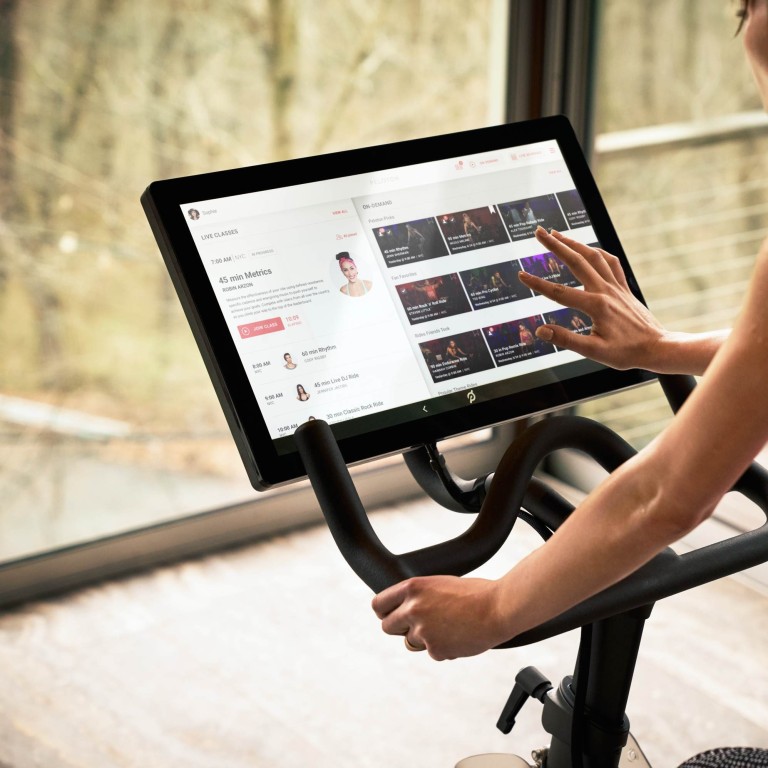
Life Fitness enters race against Peloton for virtual exercise classes
- Life Fitness is looking to replicate the training experience in health clubs and hotels
- The virtual classes feature real fitness instructors from Chicago and New York
A new entrant has joined the interactive stationary bike race with Peloton.
Life Fitness, the Rosemont, Ill.-based health club equipment manufacturer, announced this week it is rolling out on-demand exercise classes on the touch screens of its bikes, treadmills, ellipticals and other cardio fitness products.
But unlike Peloton, which brought the gym spin class home with its expensive, digitally connected bikes, Life Fitness is looking to replicate the virtual training experience in health clubs and hotels, where most of its equipment is located.
“As we’ve seen the market landscape change dramatically over the last few years on the consumer side, the desire and the appetite for this type of coaching activity in the health clubs has grown,” said Dan Wille, 49, vice-president of product development for Life Fitness.
Life Fitness On Demand has an inaugural library of 80 fitness classes across a range of equipment. The virtual classes feature real fitness instructors from Chicago and New York, who work up a sweat and exhort the machine user to “get after it” and other coach-isms designed to help you complete a 15- to 30-minute workout. The classes are filmed at a studio in New York.
While it may seem counterintuitive to bring the faux club workout into an actual health club, Wille said Life Fitness is both defending its turf and responding to growing consumer demand for the heavily advertised Peloton experience – even in health clubs, where real live exercise classes are ostensibly held.
Some health club members prefer the one-on-one training experience and avoiding the glares of fellow classmates while huffing and puffing through a workout, Wille said.
“One of the reasons we went down this path was we were seeing our commercial customers – both clubs and hospitality – putting Pelotons in their commercial space,” Wille said. “Members were saying, ‘I work out at the club, I don’t work out at home. I want that content.’”
A Peloton representative did not immediately respond to a request for comment.
There is one key difference in that content, however. Peloton offers a full schedule of live streaming classes, which enables instructors and users to interact, while Life Fitness classes are pre-recorded. The Life Fitness library will expand to 200 classes over the next year, but Wille declined to say if there are plans to offer live classes down the road.
“We have a road map on where we’re going to take this and there’s a lot of opportunity for this product,” Wille said.
Peloton has disrupted the fitness equipment world with its in-home offering featuring internet-connected stationary bikes and a subscription service. The 7-year-old company, which went public in September, raised $1.16 billion in its initial public offering and now has a market cap of nearly $10 billion – even though it has yet to turn a profit.
For financial year 2019, which ended on June 30, Peloton’s annual revenue more than doubled to $915 million, while the company’s net loss increased fourfold to nearly $196 million, according to filings with the Securities and Exchange Commission.
Demand for Peloton bikes, which start at $2,245, continues to grow, with about 577,000 connected products sold as of June 30, the company said. Peloton also sells a connected treadmill starting at $4,295.
A subscription membership to access all Peloton classes runs $39 per month.
Several companies have recently introduced interactive bikes to compete with Peloton in the home fitness market, including Echelon and NordicTrack, but Life Fitness is set on bringing the virtual training battle into the health club.
Founded in 1968, Life Fitness made its mark on the fitness world with the Lifecycle, perhaps the first widely used electronic exercise bike, expanding its equipment line as it became a staple in health clubs, hotels, training facilities and homes. In May, Brunswick sold Life Fitness to New York private equity firm KPS Capital Partners for $490 million.
Life Fitness products are in more than 250,000 facilities worldwide, including health club chains such as Planet Fitness and Chicago Athletic Clubs. The company generates about $1 billion in annual revenue, with 90% of its sales to commercial customers, Wille said. The company has a home fitness equipment line which also will feature the on-demand exercise classes.
Some of the more recent Life Fitness equipment and consoles in circulation are capable of accessing the on-demand exercise classes, but they will need a software upgrade to bring the workouts online. New equipment will come ready to go.
For those who want to bring the Life Fitness virtual training class experience home, the equipment is actually more expensive than Peloton, with the standard upright Lifecycle bike running about $3,200, Wille said. A compatible home treadmill will set you back about $6,500.
On the upside, there is no monthly subscription cost – at least for now.
“As the product evolves and as we add additional content, that may be something we look into as an opportunity,” Wille said.
For more insights into China tech, sign up for our tech newsletters, subscribe to our award-winning Inside China Tech podcast, and download the comprehensive 2019 China Internet Report. Also roam China Tech City, an award-winning interactive digital map at our sister site Abacus.

